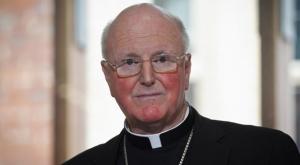In my last blog I suggested that God doesn’t fill the gaps in human knowledge. To the contrary, we humans are the gaps in God, the places where God is alienated from God’s own full love and participation in creation. The gaps are created by human conflict and a failure to work together for the flourishing of God’s creation.
A major reason for this is our propensity for inter-religious conflict. The causes of such conflict are many. In large part our conflicts arise not from religion itself, but simply because in struggles over resources we use religious affiliation as a way of choosing teams. These are serious political problems, but involve a different kind of inter-religious dialogue than that which I want to discuss today.
The specifically religious problem that makes us gaps in God is the transposition of conflicting claims about the transcendent source and end of all things into the realm of immanent social structures. Thus Christianity claims that Jesus Christ, God’s Word, is the source and end of all things. This inevitably creates conflict when it is transposed into a claim that all things must submit to Christ here and now through submission to Christ’s church. Such conflict is merely submerged when the religious other is tolerated while the business of proselytism is carried out.
A more subtle form of this transposition happens in Islam, which accepts the religious affiliation of Christians and Jews as legitimate, but only so long as Christians and Jews accept this tolerance within a distinctly Muslim understanding of of who they are: “people of the book.” It is a designation that creates a social space for religious difference, but also puts firm boundaries around that social space and explicitly acknowledges the superiority of Islam, a superiority that cannot be challenged in public.
An even more subtle form of this comes with the “one God many paths” approach associated with contemporary Hindu and pluralist movements. This approach at first appears to leave unbounded social space for each religion. But it does so by denying the validity of any exclusive claims to religious truth that these religions may have. If you are a Christian who believes that Jesus is the only way, or a Muslim who believes that the Qur’an is the final revelation, then this form of pluralism explicitly denies your central claim even as it grants you a valid path to God.
And this has public implications. Because pluralism explicitly invalidates a claim that anyone needs to change religion in order to pursue the only true path to God it leads to social pressure or, as we find in India, even to laws restricting efforts to persuade people to change religion. Christian evangelism, Buddhist persuasion, and Muslim taqwa are effectively forbidden.
To many these restrictions on religious discourse, or those posed by more obviously hegemonic claims, seem an acceptable price to pay for preventing religious conflict. I doubt it.
Religious conflict is as inevitable as political conflict and intellectual conflict. It is rooted in a desire of humans and human communities to find their identity and meaning within that which is transcendent and universal. Religion stakes a claim in the transcendent, a distinctive conceptualization of God. Alternative conceptualizations of God then pose threat to the identity of a specific religious community. Conflict of some sort results when these alternative conceptualizations engage one another.
There are at least two possible approaches to this problem. One is to restrict dialogue to those penultimate matters of human cooperation that don’t directly relate to or raise the problem of the transcendent context for human life. But this will only take us so far, because there seems to be an inherit drive for human communities to want to write their concept of the transcendent into the immanent structures of the societies in which they live, not merely their personal or communal lives.
The other is to restriction free religious exchange, including restrictions on persuasion. But this only prevents the kind of open dialogue that can lead us to more fully work together and come to some emerging concept of God, or the universal and transcendent, that can accommodate all our different religious community. And only this allow us to close the human gap in God.
By leaving unexplored the ground of religious difference we cease searching for a common language to express our human understandings of where we fit into God’s life. We return to our communitarian existence within a limited understanding of God rather than seeking some shared concept of the transcendent and universal that would allow a place for a variety of different religions.
To fill those gaps we will need a robust inter-religious dialogue that is unafraid to explore the ground of our religious differences. We may not find any immediate agreement. Yet we may find that as we translate and re-translate our essential religious insights for one another that a common language to describe our differences may emerge.
Since the first world war gave us the term “no mans land” our modern world has been characterized by formal and informal “demilitarized zones” These are places too dangerous or brutal for human habitation. In inter-religious relations we need to turn these zones into dialogue zones, because a common language to describe difference would be a tremendous step forward in filling the gaps we are in God.











